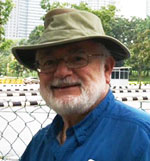By Oliver B. Pollak

ALBANY, California — Several years ago I attended the San Francisco International LGBT Film Festival. Two years ago I attended the Berlin and Beyond German Film Festival in San Francisco. This year we attended the 39th annual San Francisco Jewish Film Festival. The crowd was lined up around the block to get into the Albany Twin on Solano on Sunday at 10:30 am. It was a full house.
We saw Abe directed by Brazilian filmmaker Fernando Grostein Andrade who was born in Sao Paulo in 1981. His intellectual family was involved in urban planning, journalism, investment in sustainable enterprises, and television news. Andrade studied film at UCLA. Fernando’s mother Marta Dora Grostein was the daughter of Mauricio Grostein, a native of Ekaterinoslav in the Ukraine. The director had firsthand knowledge growing up in a multi faith family, a mix of Jewish and Catholic, as well as the tragedy of his father dying when Fernando was 10.
Before the house lights went out Director Andrade, spoke of his own upbringing, his passion for film and California. He currently lives in Los Angeles.
Abraham Solomon-Odeh, played by Noah Schnapp, is a 12-year old with a Jewish mother and a Palestinian Muslim atheist father. Whatever harmony the family had erodes as Abe, Ibrahim, Abraham, Avi, approaches his teenage years and his bar mitzvah. His Muslim grandparents and his Jewish grandfather almost break out in falafel wars at the dining room table as they relive the recriminations of their complex and contested Israeli and Palestinian competition for identity. Which should be Abe’s heritage? Abe tries to bridge the religious rift in his family with a fusion of Middle Eastern comfort food.
Abe is fascinated by food, eating food, cooking food, plating food, pleasing people and experiencing mutual gratification. He lives in Brooklyn, has mastered the subway, writes in his precocious Moleskine notebook, takes pictures with his cellphone and BLOGs. Abe’s pre-teen adventure is to avoid and blunt the antagonisms of his elders. Abe blogs about food and posts Instagram photos. He finds his way to a pop-up food stall called Mix it up where he asks to help out as an intern.
Abe is mentored by Chico, played by Seu Jorge, born in 1970, in Rio de Janeiro. The Hollywood Reporter described the mentor’s performance; “Jorge effortlessly demonstrates his artistic versatility, easily adapting to Chico’s position as chef-philosopher while mentoring Abe. For Jorge, it’s a role that relies as much on his mellifluous delivery of English-language dialogue as it does on his soulfully sincere counsel to a confused teen with great potential.”
He works in a food preparation kitchen and Popup food stall, proceeding from washing dishes and taking out trash, to chopping, cutting and slicing vegetables, and to actual food preparation. His talents, energy, and experimental spirit result in his soon being taken seriously. He focuses on reimagining the taco as a multicultural dish.
This foodie, cultural diversity, and coming of age film will appeal to YA as well as their parents and grandparents. As Rotten Tomatoes stated, “you can watch with your entire family, which is surprisingly in short short demand right now.” The cinematographer is Blasco Giurato, noted for the memorable 1988 production of Cinema Paradiso, the 1989 Academy Award winner for the Best International Feature Film.
Following the film many people decamped, appetites whetted, including five of us from the Northern California Culinary Historians contingent, and walked a few doors away to Zaytoon for a Middle East buffet, reminiscent if less splendiferous of a Tel Aviv hotel brunch. A delicious chance to meet old friends, talk and feast on falafel, pita, inconsistently spelled houmous, baba ganoush, tabbouleh, dolmades, tahini, chicken kebobs, a feta cheese, and a green salad, two rice dishes, tzatziki sauce, and more. The film reminded me of Falafel Nation: Cuisine and the Making of National Identity in Israel (2015) by Yael Raviv, one of few books for which I have written reviews but failed to submit for publication. The prix fixe did not include desert. A gracious culinary historian treated us to crumbled baklava, with a scoop of vanilla ice cream topped with ground pistachios.
*
Pollak, a professor emeritus of history at the University of Nebraska Omaha, and a lawyer, is a correspondent now based in Richmond, California. He may be contacted via oliver.pollak@sdjewishworld.com